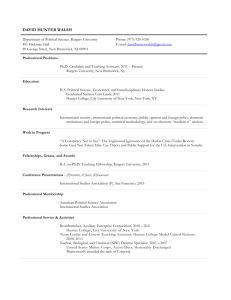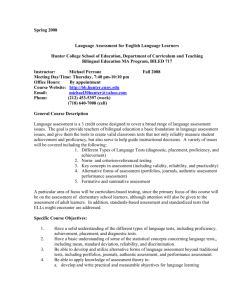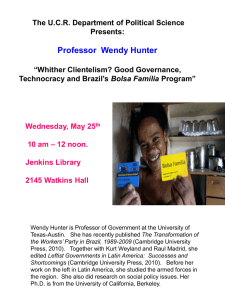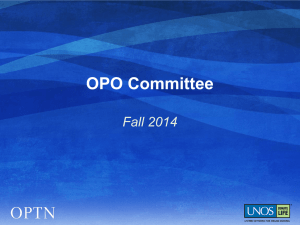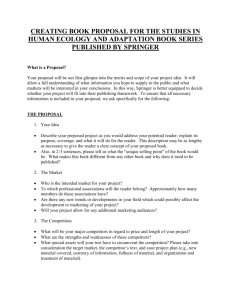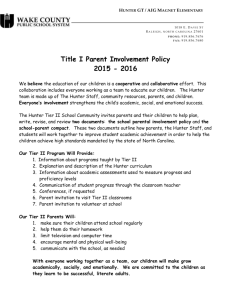CEDF 716 Nelson Joseph - Hunter College
advertisement
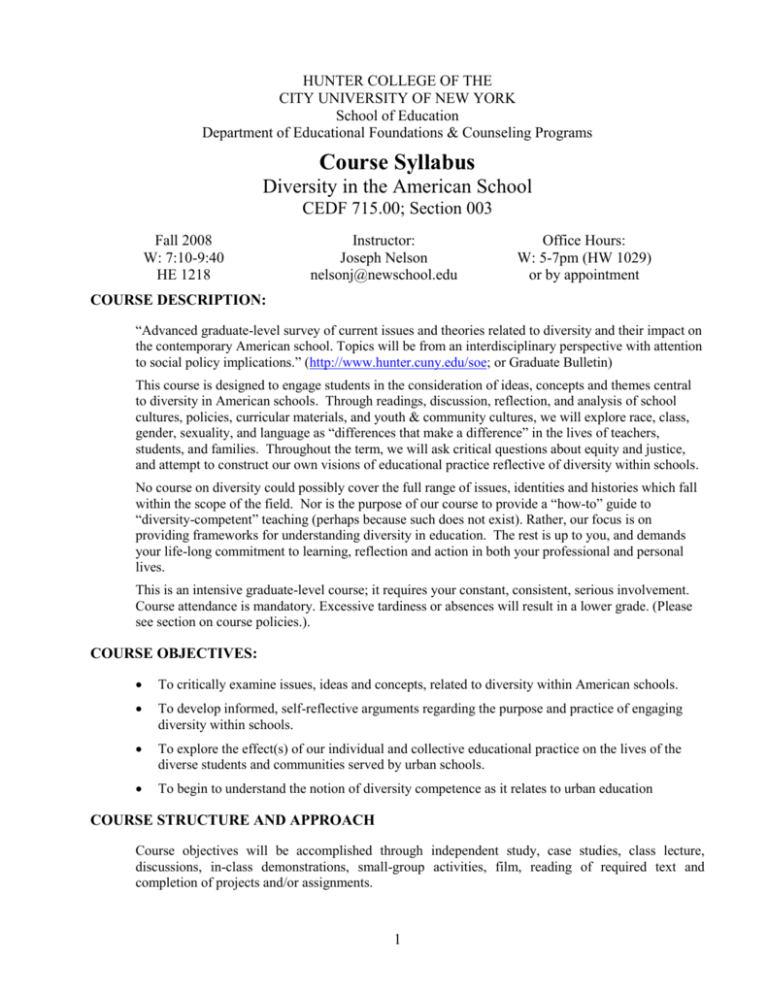
HUNTER COLLEGE OF THE CITY UNIVERSITY OF NEW YORK School of Education Department of Educational Foundations & Counseling Programs Course Syllabus Diversity in the American School CEDF 715.00; Section 003 Fall 2008 W: 7:10-9:40 HE 1218 Instructor: Joseph Nelson nelsonj@newschool.edu Office Hours: W: 5-7pm (HW 1029) or by appointment COURSE DESCRIPTION: “Advanced graduate-level survey of current issues and theories related to diversity and their impact on the contemporary American school. Topics will be from an interdisciplinary perspective with attention to social policy implications.” (http://www.hunter.cuny.edu/soe; or Graduate Bulletin) This course is designed to engage students in the consideration of ideas, concepts and themes central to diversity in American schools. Through readings, discussion, reflection, and analysis of school cultures, policies, curricular materials, and youth & community cultures, we will explore race, class, gender, sexuality, and language as “differences that make a difference” in the lives of teachers, students, and families. Throughout the term, we will ask critical questions about equity and justice, and attempt to construct our own visions of educational practice reflective of diversity within schools. No course on diversity could possibly cover the full range of issues, identities and histories which fall within the scope of the field. Nor is the purpose of our course to provide a “how-to” guide to “diversity-competent” teaching (perhaps because such does not exist). Rather, our focus is on providing frameworks for understanding diversity in education. The rest is up to you, and demands your life-long commitment to learning, reflection and action in both your professional and personal lives. This is an intensive graduate-level course; it requires your constant, consistent, serious involvement. Course attendance is mandatory. Excessive tardiness or absences will result in a lower grade. (Please see section on course policies.). COURSE OBJECTIVES: To critically examine issues, ideas and concepts, related to diversity within American schools. To develop informed, self-reflective arguments regarding the purpose and practice of engaging diversity within schools. To explore the effect(s) of our individual and collective educational practice on the lives of the diverse students and communities served by urban schools. To begin to understand the notion of diversity competence as it relates to urban education COURSE STRUCTURE AND APPROACH Course objectives will be accomplished through independent study, case studies, class lecture, discussions, in-class demonstrations, small-group activities, film, reading of required text and completion of projects and/or assignments. 1 CONCEPTUAL FRAMEWORK HUNTER COLLEGE, SCHOOL OF EDUCATION (Expanded version of the conceptual framework available online at http://www.hunter.cuny.edu/soe.) Within the larger sphere of New York City’s urban context, Hunter’s School of Education is guided by “four ... spheres of endeavor that overlap and influence each other. Ideally these spheres merge at the core and result in the empowerment of children and youth, teacher candidates, allied professionals, school community and parent partners, and Hunter College faculty.” While learning and leading in an urban context, the School of Education at Hunter College commits itself to: Knowledge, Skills and Dispositions in the listed course objectives below: Gaining Knowledge: The Teacher Candidate will: • Become familiar and conversant in the major theories and philosophies of education and complex educational issues as they relate to public schooling. • Develop knowledge of public education at large as it applies to the development of our nation and our social structure. Skills: The Teacher Candidate will: • Apply theories and/or concepts to a phenomenon, event or situation in order to explain or understand it. • Gain experience in formulating higher order, complex discussion questions and leading group discussion. • Identify and articulate their own theories and/or philosophies as they apply to educational issues. Dispositions: The Teacher Candidate will: • Demonstrate a willingness to reflect on one’s role as an elementary or secondary education teacher in an urban context. • Demonstrate a willingness to engage colleagues in on-going dialogue about education reform efforts. • Demonstrate a willingness to challenge assumptions and to apply critical skills to several important issues in the foundations of education. Engendering Professionalism through the development of the teacher candidate’s leadership ability in leading classroom discussion, being respectful and a thoughtful discussants and, applying alternative theoretical explanations to phenomena which differ from their own personal beliefs. Advocating for Social Justice through the identification of inequalities in public schooling and the exposition of effective school reforms as well as identifying/joining educational advocacy organizations. Building a Creating and Caring Environment through active participation in group projects and respectful classroom discussion on controversial issues. Urban Context through understanding the notion of “urban education” and the social, historical, and political uses this term has come to carry for different philosophical and theoretical models of education, and the social and political implications of different understandings of the term. 2 REQUIRED TEXTS: Course Pak: Nelson, J. (2008). “Diversity in the American School.” Delpit, L. (2004). Other People’s Children: cultural conflict in the classroom. New York: The New Press. The Course Pak will be distributed in-class. The Delpit (2004) text is available in the Hunter College Bookstore for approximately $10.00. You may be able to locate a used copy online for cheaper, but you will need to order/purchase the text today, so you can receive it in time to begin reading. Please plan ahead. As we all know, the semester has a tendency to be over before we know it. COURSE ASSIGNMENTS: SCHOOLING NARRATIVE (Due: 09.03.08) Students will be asked to draft a 3-5 page narrative that describes the evolution of their schooling to date. Narrative should detail the student’s elementary, intermediate, secondary and higher education while providing the social context where these phases of schooling took place. (e.g. political, social, economic, etc.) (10 pts) DISCUSSION LEADER Each student will be assigned a reading to facilitate class discussion on throughout the semester. For some readings, students may be paired and it is expected that partners will meet for at least 15 minutes outside of class to plan for the facilitation. Anticipate a 30-minute facilitation/discussion. A handout that provides a suggested approach to facilitation will be provided. A 1-3 page detailed facilitation guide must be provided for the instructor on the day of your presentation. (10 pts) BOOK REVIEW (Due: 10.15.08) Students will be assigned Delpit, L (2004). Other People’s Children: cultural conflict in the classroom. A 3-5 page book review will be drafted. The content of the review includes a brief synopsis accompanied by a critical analysis. A handout will be provided detailing appropriate content. (10pts) FIELDWORK Students will be required to conduct 10 hours of fieldwork at a community-based organization in New York City. Sites will be chosen is consultation with the instructor early in the semester. Students will ultimately submit a journal with written reflections about their experiences at the organization. (30pts) PEER-REVIEW EXERCISE (optional) Students will be asked to review a rough draft of a peer's research paper. A rubric for this critique will be provided. The submission of the rubric handout will fulfill the requirement for this exercise. RESEARCH PAPER (Due: 12.17.08) Students will be asked to write a research paper on an issue related to diversity within American schools. This paper must utilize 10 different research articles and from at least five different academic journals. Topics should also be chosen in consultation with instructor early in the semester. The paper should be at least 10-12 pages, not including references, which should be in APA style. A research proposal and literature review are due prior to the actual research paper—see course schedule for dates. (50pts) 3 COURSE GRADING: Work will be evaluated on the basis of: depth of analysis (40%), clarity in the presentation of ideas (40%) and grammar/punctuation/spelling (20%). NOTE: If you know that writing is a challenge for you, either because your grammar is poor, or because you’re not sure how to construct a paragraph or argument, I urge you to visit the Reading & Writing Center frequently (TH: 4th Floor). Your grade is based largely how effectively you are able to communicate ideas. More importantly, as an educator, you have a responsibility to sharpen your own writing (and other) skills (and experience the difficulty of stretching yourself intellectually) before you expect students to be fully engaged in the learning process: A+ A A- 100-110 95-99 90-94 B+ B B- 87-89 83-86 80-82 C+ C F 77-79 75-76 Less than 75 COURSE SCHEDULE 08.29 Introductions & Syllabus Problem posing – Cultural conflict in the classroom 09.03 Obidah, J. & Manheim, T. (2001). Racial and Cultural Perspectives in Student Behavior (Chapter 4), The risks in crossing boarders (Chapter 5), On cultural conflict in the classroom: Lisa Delpit Dialogues with the Authors (Chapter 6), and For those who dare: transforming teacher practices (Chapter 7). Because of the Kids: Facing racial and cultural differences in schools. New York: Teachers College Press. (Schooling Narrative Due) 09.10 Fieldwork I 09.17 Delpit, L. (2004). Other People’s Children: cultural conflict in the classroom. New York: The New Press. 09.24 Fieldwork II 10.01-10.08 No class 10.15 Racial Categories and Racial Formation in American Schools and Society Omi, M, & Winant, H. Towards a racial formation perspective, Racial Formation Perspective (Chapter 4), Ethnicity (Chapter 1). Racial Formation in the United States: From the 1960’s to the 1990’s. New York: Taylor & Francis, Incorporated. Hacker, A. (2003). Dividing American Society (Chapter 1). Two Nations: black & white, hostile, separate and unequal. New York: Simon & Schuster. Marger, M. (2005). Techniques of dominance: prejudice [racism] and discrimination (Chapter 3). Race and Ethnic Relations. New York: Wadsworth. Lewis, A. (2003). Examining the color line in schools (Chapter 1), There is no race in the schoolyard (Chapter 2), Schooling and the social reproduction of racial inequality (Chapter 6). Race in the Schoolyard: negotiating the color-line in schools and communities. Rutgers, NJ: Rutgers University Press. (Book Review Due) 4 10.22 RESEARCH PAPER WORKSHOP: WORKSHOP: Research Paper Writing & Library Technology Location: LCLC Computer Lab, 7th Floor Hunter Library. (Research Proposal Due) 10.29 Social class in American Schools Aronowitz, S. (2004). Class matters (Chapter 1). How Class Works: power and social movements. New Haven, Connecticut: Yale University Press. Anyon, J. (1998). Social class, race and educational reform at Marcy School (Chapter 2). Ghetto Schooling: a political economy for urban educational reform. New York: Teachers College Press. Nocera, J. (1990). How the Middle Class has helped Ruin the Public Schools” in Utne Reader, September/October. pp. 66-72. Gender in the classroom Connell, R.W. (2002). The questions of gender (Chapter 1). Gender. New Jersey: Wiley, Jon & Sons, Incorporated. Sax, L. (2006). School. Why Gender Matters. New York: Broadway Books. 11.05 Fieldwork III 11.12 Schooling and Sexual Orientation Birden, S. (2004). Compulsory heterosexuality as mis-education (Chapter 1). Rethinking Sexual Identity in Education. New York: Rowman & Littlefield Publishers, Incorporated. Rasmussen, M.L. (2005). Becoming Subjects: sexualities and secondary schooling. New York: Teachers College Press. Language Valenzuela, A. (1999). Seguin High School in Historical Perspective: Mexican Americans (Chapter 1), Struggle for Educational Opportunity in Houston (Chapter 2). Subtractive Schooling and divisions among youth (Chapter 5). Subtractive Schooling: U.S. Mexican Youth and politics of caring. New York: State University New York Press. Disabilities and disproportionality The Metropolitan Center for Urban Education (2007). Disproportionality and overidentification. Memorandum: Office of Vocational and Educational Services for Individuals with Disabilities (VESID), Title I: Amendments to the Individuals with Disabilities Education Act. Technical Assistance Center on Disproportionality. New York: New York University, Steinhardt School of Culture, Education and Human Development. (Literature Review Due) 11.19 Fieldwork IV 11.26 No class (Thanksgiving) 5 12.03 The role of research on diversity within schools Noguera, P. (2003). Opportunities: Closing the Achievement Gap in Berkeley (Chapter 4). City Schools and the American Dream: reclaiming the promise of public education. New York: Teachers College Press. Lipman, P. (1998). Riverton, Its schools and restructuring. Race, Class and Power in School Restructuring. New York: State University of New York Press. 12.10 Last Day – Peer Review Exercise (in-class) 12.17 RESEARCH PAPER DUE (HW 1029) COURSE POLICIES Attendance/Class Participation: This course only meets fourteen times. Please come to each session on time with all readings done, and prepared for dialogue. If you are absent more than once, for any reason, your final grade will be lowered one grade for each additional absence. This policy applies whether you were ill or simply decided to skip class, since you cannot make up missed learning. If you are late to class more than twice, this too will begin to count toward absences (with two late arrivals counting as one absence). You are late to class if you arrive more than 15-minutes after class begins or after the instructor arrives, whichever is later. Active and consistent participation will yield additional points at the instructor’s discretion. NOTE: Students may acquire additional points through the completion of peer evaluations for community ethnography presentations. Assignments: All assignments should be professional in appearance. Paper should be typed, double-spaced, stapled once in the top left-hand corner. Please make a copy of all written work before submitting. Do not use any decorative covers or binders for any assignment. Assignments received in this fashion will be returned ungraded. Late Assignments: Assignments not turned in by the due date listed on the course schedule will be considered late. It is the responsibility of the student to turn in assignments on time. Blackboard: The course will have a Hunter College Blackboard website. URL will be provided in class. Its primary function will be to serve as a resource center. Students can track progress in course (e.g. Gradebook), view course syllabus, assignment descriptions, article/book chapter postings, etc. However, I will mostly communicate with students [outside of class] through personal email. A Hunter College email address is not required. I only ask that the email address be a highly perused account. Cell Phones: Silence all cell phones before class begins. Do not under any circumstances answer a call during the class session. If you need to take a call, leave the room first. 6 ACADEMIC HONESTY (p. 12 of the graduate catalog, p. 49 of the undergraduate catalog) Any deliberate borrowing of the ideas, terms, statements, or knowledge of others without clear and specific acknowledgment of the source is intellectual theft and is called plagiarism. It is not plagiarism to borrow the ideas, terms, statements, or knowledge of others if the source is clearly and specifically acknowledged. Students who consult such critical material and wish to include some of the insights, terms or statements encountered must provide full citations in an appropriate form. (Also see course web site for Resolution on Student Academic Integrity and Plagiarism Unanimously Adopted at the April 29, 2003 Plenary.) ACCESS AND ACCOMMODATIONS FOR STUDENTS WITH DISABILITIES In compliance with the American Disability Act of 1990 (ADA) and with Section 504 of the Rehabilitation Act of 1973, Hunter College is committed to ensuring educational parity and accommodations for all students with documented disabilities and/or medical conditions. It is recommended that all students with documented disabilities (Emotional, Medical, Physical and/ or Learning) consult the Office of AccessABILITY located in Room E1124 to secure necessary academic accommodations. For further information and assistance please call (212) 772-4857/TTY; (212) 650-3230. EXPECTATIONS FOR WRITTEN PROFICIENCY Students must demonstrate consistently written English in coursework. The Hunter College Reading & Writing Center provides tutoring to students across the curriculum and at al academic levels. For more information, see http://rwc.hunter.cuny.edu. In addition, the Teacher Placement Office in the School of Education offers a writing workshop during the semester and a series of free writing classes are offered to students who are in need of additional support in honing their writing skills. In both cases, stop y room 1000 Hunter West for information and dates of workshops. 7
